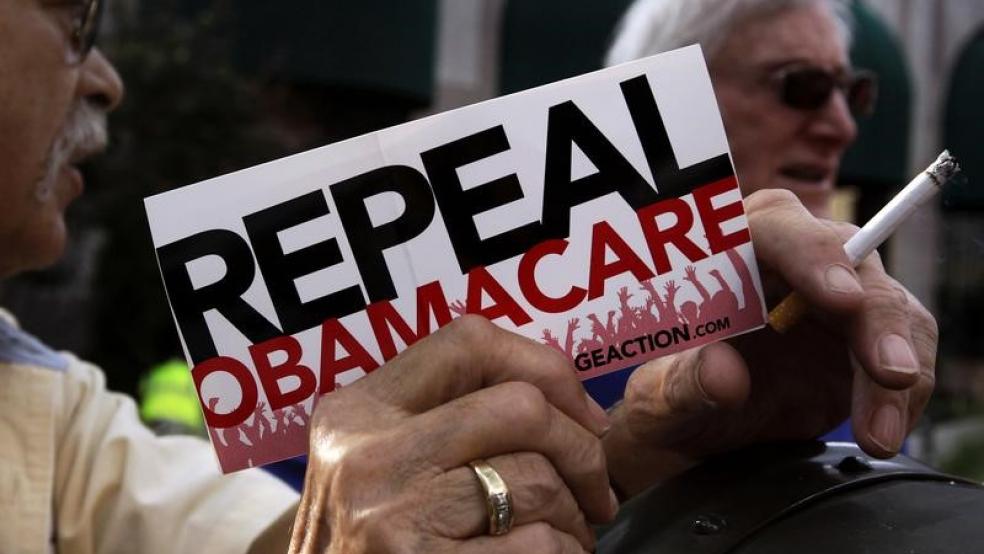The effort to repeal and replace the Affordable Care Act, which many assumed was dead or at least in a state of suspended animation for the foreseeable future, may be showing some stirring of life after all. After the Senate’s attempt to pass a bill that few members of the body wanted to become law failed by a single vote in July, top leaders in the chamber have been signaling that it is time to move on to tax reform and other priorities.
However, given the way the Congress is currently divided, with Republicans holding both houses but boasting only a 52-48 majority in the Senate, the opportunities for the GOP to pass controversial legislation that can’t garner any Democratic support are limited. Because the Democrats have enough seats in the Senate to filibuster most legislation, Republicans face a choice between trying to pass bills that have bipartisan support or cramming their most important priorities into budget reconciliation bills -- legislation that, for all intents and purposes, is available only once a year.
Related: Heads Up — Health Care Is Still in Trouble
That gives the GOP two chances to use reconciliation in the current Congress: once in legislation related to the fiscal 2017 budget and once in relation to 2018. However, the clock is ticking down on the 2017 fiscal year, which closes at the end of September.
South Carolina Sen. Lindsey Graham is apparently among those in the GOP who are not inclined to surrender the 2017 version of reconciliation without a fight.
Back in July, when GOP leaders were fighting to get everyone in the party aligned behind a single repeal and replace bill, Graham, along with Louisiana Sen. Bill Cassidy and Nevada Sen. Dean Heller, proposed his own bill, one radically different from everything else that had been put forward.
Explained simply, the Graham bill would eliminate the Affordable Care Act while keeping the majority of its tax increases in place. The funds from those taxes would then be redirected to the individual states, with state governments themselves responsible for constructing a statewide health insurance system for their citizens.
From a Republican standpoint, the plan has several advantages.
Related: The Looming Fiscal Train Wreck Means Trump Won’t Get His Wall. Here’s Why
Previous attempts to eliminate the ACA had come under withering criticism because every independent analysis of them predicted that they would result in tens of millions fewer Americans with health insurance. The bill Graham is pushing might do the same. Or it might not. It’s difficult to say, because each state would be in charge of its own system, and the states haven’t yet constructed them. Those who fervently believe that state-level planning and spending could be more efficient can argue that care might actually improve, even though the amount of money being spent on it would fall.
The idea of sending responsibility back to the states will likely appeal to GOP lawmakers on at least two levels. First, it invokes the principle that smaller, more limited government is better. Second, it means that if anything goes terribly wrong, the blame can be shifted to state legislatures and away from Congress.
Finally, it would absolve them of the failure to keep their seven years of promises to repeal and replace the ACA -- without doing any of the really hard work involved in crafting a replacement.
The plan the Graham seems to be hatching is to pressure Republican senators by bringing the governors of their respective states along first, thereby cobbling together the 50 votes needed to pass a reconciliation bill through the Senate.
“I believe there's 50 votes for this,” Graham said in an interview on Fox News Sunday this weekend. “I'm hoping to have 25 Republican governors come out the next couple of weeks for the block grant approach, taking all the money and power out of Washington and sending it back to the states. By 2026, every state gets the same contribution from the federal government.”
Related: Trump May Be in a Legislative Slump, but His Energy Agenda Is Getting Lots of Hits
He added, “All of us are in trouble as Republicans for promising for seven years we'd repeal and replace Obamacare and failing miserably ... If we move on and just ignore our failure on health care, repealing and replacing Obamacare, we're going to fail miserably in 2018 and 2020.”
It remains unclear how much support Graham has from Republican leaders in the Senate. However, if the bill comes to a vote, it can expect considerable opposition from some quarters.
Back when it was first introduced, the Center on Budget and Policy Priorities warned that it would slash hundreds of billions of dollars from health care spending, a funding loss so severe that no conceivable improvement in efficiency could prevent tens of millions of Americans from losing their insurance.
CBPP also predicted that the bill would cause chaos in health insurance markets because it would “create significant near-term uncertainty and disruption in the individual market.”
In fact, the organization predicted, “For insurers, [the bill] would have much the same consequences as proposals to repeal the ACA with no replacement.”





